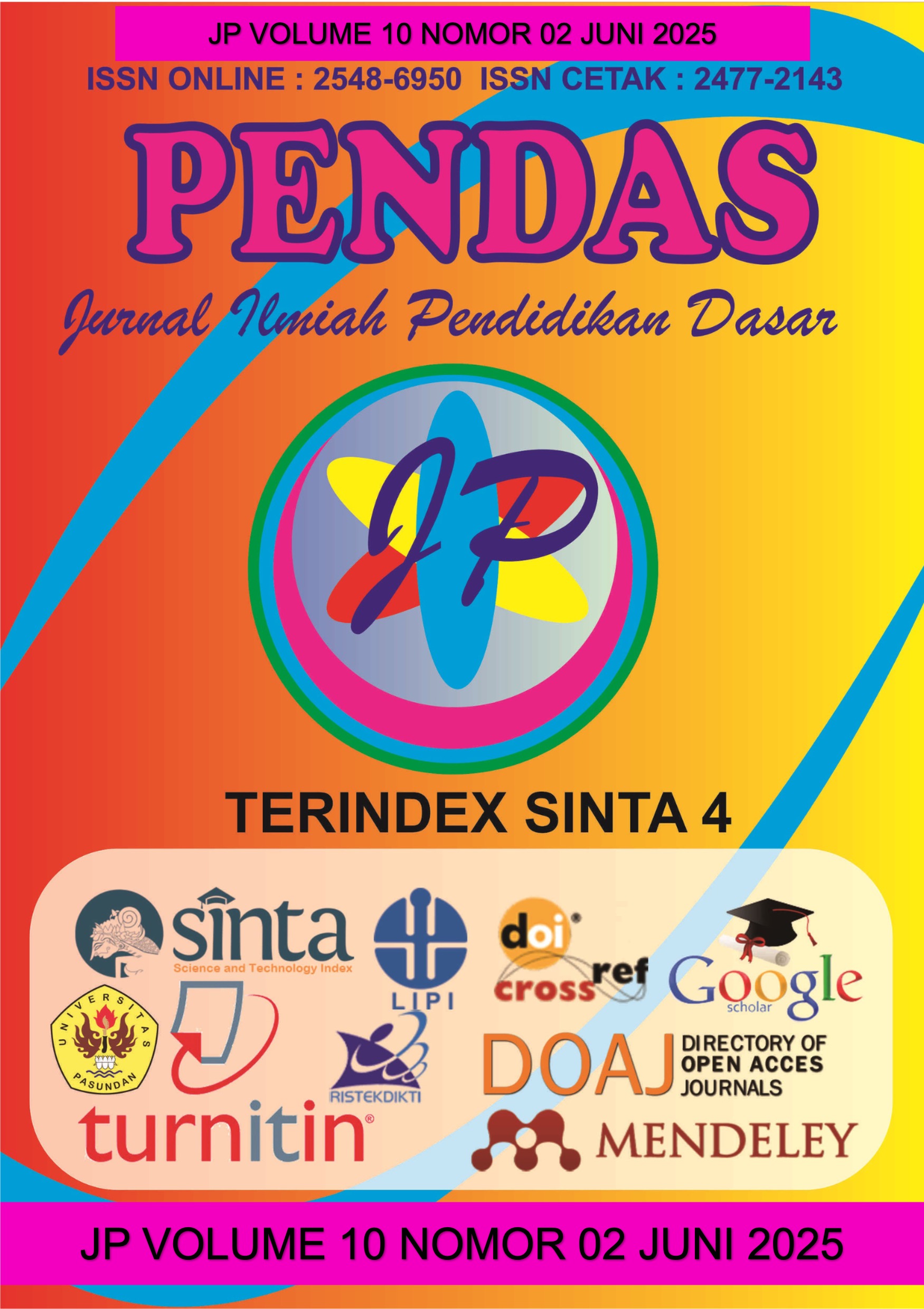PERAN GURU DALAM MENCIPTAKAN IKLIM KELAS KONDUSIF UNTUK MENINGKATKAN MOTIVASI BELAJAR DALAM PEMBELAJARAN PAI DI SEKOLAH DASAR
DOI:
https://doi.org/10.23969/jp.v10i02.11845Keywords:
Class Climate, Learning Motivation, Islamic EducationAbstract
A conducive learning climate can increase student motivation because students will feel comfortable and focus on participating in learning activities. A conducive classroom climate plays an important role in creating student learning motivation in the learning process. The classroom climate will trigger a good learning attitude in students. The big whisper of student learning effort depends on a conducive classroom climate. The purpose of this study was to examine the teacher's role in creating a classroom climate and motivation to learn PAI at SDN Trayu Kulonprogo. This study uses a qualitative method with a case study approach. The research location is at SDN Trayu, Galur District, Kulonprogo. The data source used is primary data, which was conducted through interviews with one PAI teacher as an informant and observation, as well as secondary data, namely related documents. This study uses three techniques in data collection: observation, interviews, and documentation. Data analysis involves three activity streams: data reduction, data presentation, and the formulation of conclusions. The validity of the data in the study was checked using two filtering and data validity checking techniques, namely observation persistence and triangulation, including source triangulation and technique triangulation. The results of the study show that the teacher's role in creating a conducive classroom climate and learning interest in PAI learning at Trayu Elementary School has contributed to supporting the motivation of their learning activities. Learning with various representations will generate student motivation, which leads to a conditional classroom climate for learning.
Downloads
References
Amelia, M. (2016). Pengaruh Adversity Quotient, Iklim Kelas dan Kebiasaan Belajar Terhadap Prestasi Belajar Ekonomi Siswa Kelas X IIs SMA Negeri di Kabupaten Tanah Datar. Economica, 4(1).
Aryani, D., Evayenny, & Oktaviana, E. (2020). Hubungan Iklim Organisasi Kelas Dengan Motivasi Belajar Peserta Didik Kelas IV SD Negeri Tugu 4 Cimanggis. Prosiding Seminar Nasional Pendidikan STKIP Kusuma Negara II, 92–100. http://jurnal.stkipkusumanegara.ac.id/index.php/semnara2020/article/view/481%0Ahttp://jurnal.stkipkusumanegara.ac.id/index.php/semnara2020/article/download/481/385
Atikasari, W., & Ulfa, M. (2021). Prosiding Seminar Nasional Pendidikan STKIP Kusuma Negara III Hubungan Iklim Kelas Dengan Hasil Belajar Matematika Dalam Penyelesaian Soal Cerita. 451–461.
Dewi, P. F. (2017). Pengaruh Guru Profesional Dan Iklim Sekolah Terpadu Ponorogo. Jurnal Muslim Heritage, 1(2), 369–388.
Hadiyanto. (2016). Teori dan Pegembangan Iklim Kelas dan Iklim Sekolah (1st ed., Issue November). Kencana.
Husna, R., Buwono, S., & Matsum, J. H. (2020). Pengaruh Iklim Kelas dan Minat Belajar Terhadap Hasil Belajar Siswa pada Pelajaran Ekonomi pada SMA. Jurnal Ilmiah: Syntax Indonesia, 1(2), 274–282.
Khobir, K., Yusuf, M., & Alhusaini, A. (2019). Keterampilan Guru dalam Mengelola Kelas untuk Anak Berkebutuhan Khusus. JMKSP (Jurnal Manajemen, Kepemimpinan, Dan Supervisi Pendidikan), 4(2).
Khusana, A. A., Suhartono, & Rokhmaniyah. (2021). Analisis Pengelolaan Kelas untuk Menciptakan Iklim Kelas Yang Kondusif dI Kelas IV SDN Argopeni Tahun Ajaran 2020/2021. Kalam Cendekia: Jurnal Ilmiah Kependidikan, 9(2).
Luluk Masroatul Lailiyah, Moh. Irfan Burhani, & Prima Ayu Rizqi Mahanani. (2022). Hubungan Antara Iklim Sekolah Dengan Keterlibatan Siswa Dalam Belajar. Happiness, Journal of Psychology and Islamic Science, 1(1), 31–38. https://doi.org/10.30762/happiness.v1i1.326
Mawarni, E. (2019). Hubungan Antara Iklim Sekolah Dengan Perilaku Membolos Remaja. Psikoborneo: Jurnal Ilmiah Psikologi, 7(1), 113–119. https://doi.org/10.30872/psikoborneo.v7i1.4713
Minsih, & D, A. G. (2018). Peranan Guru Dalam Pengelolaan Kelas. Jurnal Profesi Pendidikan Dasar, 5(1), 192–210. https://doi.org/10.24252/lp.2010v13n2a6
Mursalin, Sulaiman, & Nurmasyitah. (2017). Peran Guru Dalam Pelaksanaan Manajemen Kelas Di Gugus Bungong Seulanga kecamatan Syiah Kualakota Banda Aceh. Jurnal Ilmiah Pendidikan Guru Sekolah Dasar FKP Unsyiah, 2, 105–114. http://jim.unsyiah.ac.id/pgsd
Nasution, I. N., & Syaf, A. (2018). Hubungan iklim kelas terhadap motivasi belajar siswa smk abdurrab. PSYCHOPOLYTAN (Jurnal Psikologi), 1(2), 98–110.
Nurhayati, N., Sunyono, S., & ... (2017). Efektivitas Iklim Kelas Berbasis Koopertif untuk Meningkatkan Model Mental dan Penguasaan Konsep. … Pembelajaran Fisika, 1. http://repository.lppm.unila.ac.id/id/eprint/23480%0Ahttp://repository.lppm.unila.ac.id/23480/1/Jurnal 2017_5_J.Fisika.pdf
Oskar, Parijo, & Aminuyati. (2014). Pengaruh Iklim Belajar yang Kondusif Terhadap Hasil Belajar Siswa Mata Pelajaran IPS Terpadu di SMP. Applied Microbiology and Biotechnology, 85(1), 2071–2079.
Pritami, S. E., Purwoko, A. A., & Savalas, L. R. T. (2014). Hubungan Iklim Kelas Dan Sikap Siswa Terhadap Pelajaran Kimia Dengan Prestasi Belajar Kimia Siswa Kelas Xi Ipa Sma Negeri Se-Kota Mataram Tahun Pelajaran 2012/2013. Jurnal Pijar Mipa, 9(2), 73–77. https://doi.org/10.29303/jpm.v9i2.48
Purwandari, S., Cholimah, N., & Pradana, A. B. A. (2016). Menciptakan iklim kelas yang kondusif melalui sistem pengajaran berbasis data (Studi Kasus Kelas Rendah di MI Annur). Jurnal Penelitian Dan Artikel Pendidikan, 8(2), 270–282.
Ramadhani, H. S., Prawiyogi, A. G., & ... (2020). Hubungan Iklim Kelas dengan Menyimak Cerita Dongeng pada Mata Pelajaran Bahasa Indonesia Siswa Kelas V SD. Indonesian Journal of …, 1(September), 241–252. http://journal.ubpkarawang.ac.id/mahasiswa/index.php/IJPSE/article/view/583
Sari, D. P., Rusmin, & Deskon. (2018). Pengaruh Iklim Kelas Terhadap Motivasi Belajar Peserta Didik di SMAN 3 Tanjung Raja. 5(1).
Downloads
Published
Issue
Section
License
Copyright (c) 2025 Pendas : Jurnal Ilmiah Pendidikan Dasar

This work is licensed under a Creative Commons Attribution 4.0 International License.



















